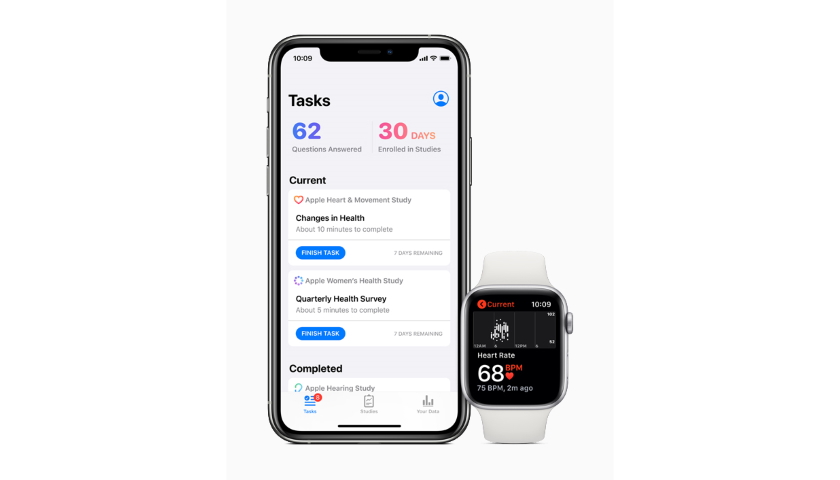Apple launches Research app, along with three health studies

Apple has launched its Research app – first promised in September - that allows users of its iPhone and Watch devices in the US to participate in health research studies.
The app officially went live yesterday, and early adopters can choose to participate in three studies, one focusing on menstrual cycles and women’s health, another on movement and heart health, and the third on hearing.
Jeff Williams, Apple’s chief operating officer, said: “Participants on the Research app have the opportunity to make a tremendous impact that could lead to new discoveries and help millions lead healthier lives.”
The women’s health study will try to increase understanding of the relationship between menstrual cycles and health conditions like polycystic ovary syndrome (PCOS), infertility, osteoporosis and menopausal transition.
The app will collect cycle tracking data and use monthly surveys to gauge each user’s individual experiences, and try to gauge the impact of behaviours and habits on reproductive health. It’s being carried out with the help of Harvard University and the National Institute of Environmental Health Sciences (NIEHS).
The heart and movement study – with the help of Brigham and Women’s Hospital and the American Heart Association – will tap into the Apple devices fitness tracker and cardiovascular monitoring functions to see if they can be used as early warning systems for atrial fibrillation (AFib), heart disease or declining mobility.
The aim is to develop interventions that can promote healthy movement and improved cardiovascular health, helping people “lead longer, healthier and more active lives,” says Apple.
In the hearing study, the impact of sound exposure on hearing health and stress levels over time will be measured, drawing on headphone usage and environmental sound exposure data collated via the iPhone and Noise app on the Apple Watch.
Apple will work with the University of Michigan on the study, which will randomly assign participants into two groups to see if receiving excessive noise warnings via Apple’s companion Health app can motivate users to modify their listening behaviours. It will also assess the impact of noise exposure on stress levels and cardiovascular health.
Apple’s push into digital health has already yielded encouraging results with the older version of the Apple Watch in AFib diagnosis, suggesting it could provide a potentially life-saving early warning for the condition.
A new study, partnered with Johnson & Johnson, is due to start before the end of the year and will put the new Apple Watch – which includes an onboard electrocardiogram (ECG) function - through its paces in the early detection and diagnosis of AFib and see if it can help prevent cardiovascular outcomes such as heart attack, stroke and death.
A key advantage with the new launch is that while earlier studies required the development and installation of apps on their devices, Research provides a dedicated home for patients to opt-in and even participate in multiple trials at the same time.
Data privacy is a big issue of course, and Apple insists it has put this front and centre of the new app.
“The Research app was carefully created to only share data with the chosen studies when the user approves,” it says.
“It also includes a clear enrolment flow with detailed consent that explains how data will be used and allows a user to control the type of data shared with each study.”
The launch of Research is just one more example of how the big technology companies have set their sights on digital/wearable health.
Just last week, Google parent Alphabet announced a $2.1 billion deal to acquire fitness tracker specialist Fitbit, setting up a face-off in the market with Apple.













